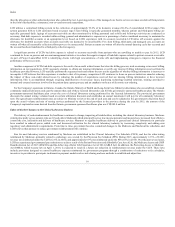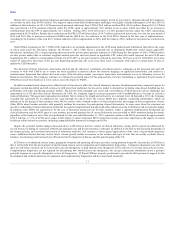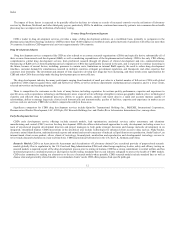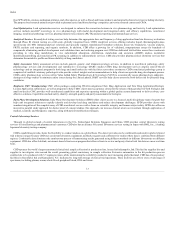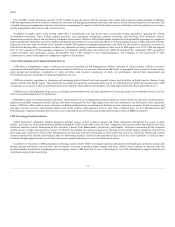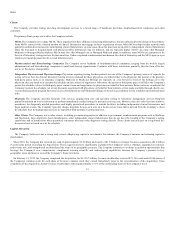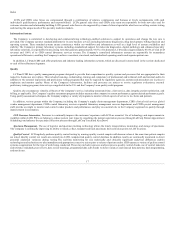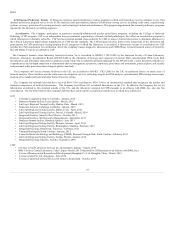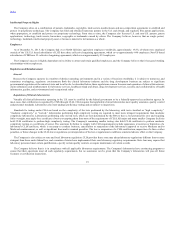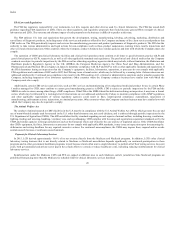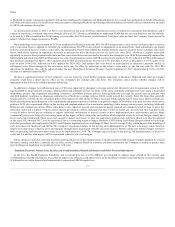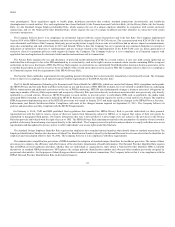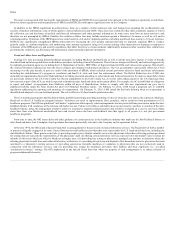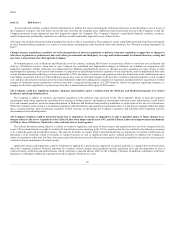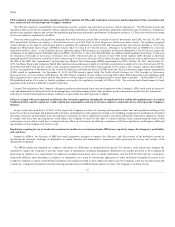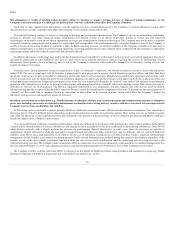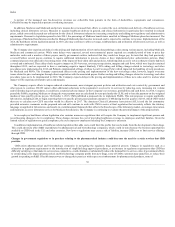LabCorp 2015 Annual Report Download - page 20
Download and view the complete annual report
Please find page 20 of the 2015 LabCorp annual report below. You can navigate through the pages in the report by either clicking on the pages listed below, or by using the keyword search tool below to find specific information within the annual report.
Index
The FDA has regulatory responsibility over instruments, test kits, reagents and other devices used by clinical laboratories. The FDA has issued draft
guidance regarding FDA regulation of LDTs. There are other regulatory and legislative proposals that would increase general FDA oversight of clinical
laboratories and LDTs. The outcome and ultimate impact of such proposals on the business is difficult to predict at this time.
The FDA enforces U.S. laws and regulations that govern the development, testing, manufacturing, labeling, advertising, marketing, distribution and
surveillance of diagnostic products, including many of the services and products offered by the Company and many of the client services and products that
CDD works on. The FDA periodically inspects and reviews the manufacturing processes and product performance of diagnostic products. The FDA has the
authority to take various administrative and legal actions for non-compliance such as fines, product suspensions, warning letters, recalls, injunctions and
other civil and criminal sanctions. Other countries where the Company conducts business have similar agencies and laws with which the Company must also
comply.
The operation of CDD’s preclinical laboratory facilities and clinical trial operations must conform at all times to good laboratory practice (GLP) and
good clinical practice (GCP), respectively, as well as all other applicable standards and regulations. The preclinical and clinical studies that the Company
conducts are subject to periodic inspections by the FDA as well as other drug regulatory agencies which may include, without limitation, the Medicines and
Healthcare products Regulatory Agency in the U.K. (MHRA), the European Medicines Agency, the China Food and Drug Administration, and the
Pharmaceuticals and Medical Devices Agency in Japan to determine compliance with GLP and GCP as well as other applicable standards and regulations. If
the FDA determines during an inspection that the Company’s equipment, facilities, laboratories, operations, or processes do not comply with applicable
FDA regulations and conditions of GLP and/or GCP, the FDA may issue a formal notice, which may be followed by a warning letter if observations are not
addressed satisfactorily. Continued non-compliance may result in the FDA seeking civil, criminal or administrative sanctions and/or remedies against the
Company, including suspension of its laboratory operations. Other countries where the Company conducts business have similar laws with which the
Company must also comply.
Additionally, certain CDD services and activities, such as CMC services and manufacturing of investigational medicinal product for use in certain Phase
I studies managed by CDD, must conform to current good manufacturing practice (cGMP). CDD is subject to periodic inspections by the FDA and the
MHRA in order to assess, among other things, cGMP compliance. If the FDA or the MHRA identifies deficiencies during an inspection, it may issue a formal
notice, which may be followed by a warning letter if observations are not addressed satisfactorily. Failure to maintain compliance with cGMP regulations
and other applicable requirements of various regulatory agencies could result in fines, unanticipated compliance expenditures, suspension of
manufacturing, enforcement actions, injunctions, or criminal prosecution. Other countries where the Company conducts business may have similar laws with
which the Company may also be required to comply.
The conduct of animal research at CDD’s facilities in the U.S. must be in compliance with the U.S. Animal Welfare Act (AWA), whichgoverns the care and
use of warm-blooded animals used for research in the U.S. other than laboratory rats, mice and chickens, and is enforced through periodic inspections by the
U.S. Department of Agriculture (USDA). The AWA establishes facility standards regarding several aspects of animal welfare, including housing, ventilation,
lighting, feeding and watering, handling, veterinary care, and recordkeeping.CDD complies with licensing and registration requirement standards set by the
USDA and similar agencies in foreign jurisdictions such as the European Union and China for the care and use of regulated species. If the USDA determines
that CDD’s equipment, facilities, laboratories or processes do not comply with applicable AWA standards, it may issue an inspection report documenting the
deficiencies and setting deadlines for any required corrective actions. For continued noncompliance, the USDA may impose fines, suspend and/or revoke
animal research licenses or confiscate research animals.
In 2015, LCD derived approximately 16.0% of its net revenue directly from the Medicare and Medicaid programs. In addition, LCD's other clinical
laboratory testing business that is not directly related to Medicare or Medicaid nevertheless depends significantly on continued participation in these
programs and in other government healthcare programs, in part because clients often want a single laboratory to perform all of their testing services. In recent
years, both governmental and private sector payers have made efforts to contain or reduce healthcare costs, including reducing reimbursement for clinical
laboratory services.
Reimbursement under the Medicare CLFS and PFS are capped at different rates in each Medicare carrier's jurisdiction. State Medicaid programs are
prohibited from paying more than the Medicare fee schedule limit for clinical laboratory services furnished
20


